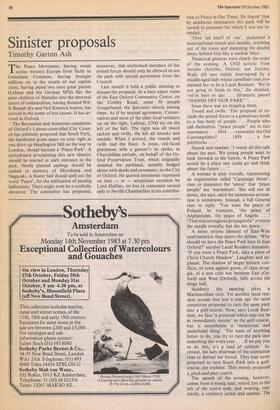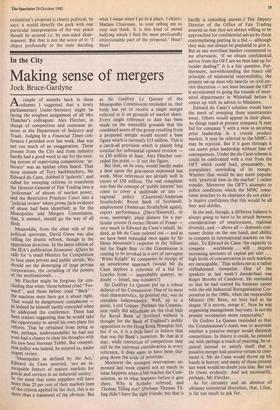Sinister proposals
Timothy Garton Ash
The Peace Movement, having swept across western Europe from Sicily to Greenham Common, having brought millions on to the streets of our capital cities, having piped two once great parties (Labour and the German SPD) like the poor children of Hamelin into the electoral desert of unilateralism, having shouted Wil- ly Brandt dry and Neil Kinnock hoarse, has arrived in the home of lost causes. It has ar- rived in Oxford.
The Recreation and Amenities committee of Oxford's Labour-controlled City Coun- cil has solemnly proposed that South Park, the handsome green space on your right as you drive up Headington Hill on the way to London, should become a 'Peace Park'. A noticeboard proclaiming this new identity should be erected at each entrance to the park. Newly planted saplings should be named in memory of Hiroshima and Nagasaki. A flower bed should spell out the word 'Peace', for the edification of passing balloonists. There might even be a symbolic dovecote. The committee has proposed, moreover, that uniformed members of the armed forces should only be allowed to use the park with special permission from the Council.
Last month it held a public meeting to discuss the proposal. In a bare upper room of the East Oxford Community Centre, on the Cowley Road, some 50 people foregathered, the Spectator silently among them. As if by mutual agreement, Conser- vatives and most of the elder local residents sat on the right, Labour, CND etc on the left of the hall. The right was all tweed jackets and twills, the left all smocks and sandals. When I arrived, the tweeds and twills had the floor. A stout, red-faced gentleman with a gunner's tie spoke, in Churchillian periods, on behalf of the Ox- ford Preservation Trust, which originally donated the parkland, suitably hedged about with deeds and covenants, to the City of Oxford. He quoted sentiments expressed on that — er — auspicious occasion by Lord Halifax, no less (a statesman second only to Neville Chamberlain in his contribu- tion to Peace in Our Time). He feared 'that by assiduous insinuation this park will be turned to purposes for which it was not in- tended.'
'Oive 'ad enuff of viss', exclaimed a moustachioed smock and sandals, storming out of the room and slamming the double doors behind him like a nuclear blast.
Theatrical gestures were clearly the order of the evening. A CND activist from Jericho (Jericho, Oxford, not Jericho, Walls of) was rudely interrupted by a middle-aged lady whose camelhair coat pro- claimed her to be a Local Resident. 'We're not going to listen to this,' she shouted, 'we're here to say: . . . (dramatic pause) "HANDS OFF OUR PARK"'.
Soon there was no stopping them.
Tweed and twills: 'The proposal to ex- clude the armed forces is a gratuitous insult to a fine body of people . . . People who call themselves "peace people" are in fact warmakers . . 1914. . . remember the Old Contemptibles? . . . 1939 . . . a few pitchforks .
Smock and sandals: 'I resent all this talk about the past. We young people want to look forward to the future. A Peace Park would be a place one could go and think about the future . .
A woman in pink overalls, representing an organisation called 'Campaign Atom', rises to denounce the 'smear' that 'peace people' are `warmakers'. She will not sit down, she says, until the monstrous accusa- tion is withdrawn. Instead, a full General rises to reply. 'You want the peace of Poland, he trumpets, 'the peace of Afghanistan, the peace of Angola . . 'That was outrageous propaganda!' protests the purple overalls; but she sits down.
A more serious element of East-West confrontation then enters the debate. 'Why should we have the Peace Park here in East Oxford?' another Local Resident demands. `If you want a Peace Park, take a piece of Christ Church Meadow'. Laughter and ap- plause. The shadow of larger historic con- flicts, of town against gown, of class strug- gle, of a new cold war between East (Ox- ford) and West (Oxford), falls across the dingy hall.
Suddenly the meeting takes a Machiavellian turn. Yet another local resi- dent reveals that just a year ago the same committee proposed to turn the same park into a golf-course. Now, says Local Resi- dent, we face 'a proposal which may not be as immediately sinister' as the golf-course, but is nonetheless a 'monstrous and underhand thing'. 'For want of anything better to do, you try to turn the park into something else every year. . . If we pay you to do this, it's a load of rubbish.' In- censed, the lady chairman of the committee rises to defend her brood. They had never proposed to turn South Park into a golf- course, she explains. They merely proposed a pitch-and-pull course.
The speech of the evening, however, comes from a young man, seated just to the left of the centre aisle, and wearing, con- trarily, a corduroy jacket and sandals. The committee's proposal is clearly political, he says: it would identify the park with one particular interpretation of the way peace should be secured i.e. by one-sided disar- mament. But that is not the worst of it: '1 object profoundly to the state deciding what I mean when I go to a place. I object, Madam Chairman, to your telling me to stop and think. It is this kind of moral bullying which I find the most profoundly objectionable part of the proposal.' Hear! Hear!















































 Previous page
Previous page